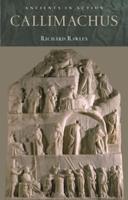
Bloomsbury (2019) p/b 139pp £16.99 (ISBN 9781474254854)
This slender book is an addition to the Ancients in Action series, which already numbers more than 20 items; since it is aimed at the Greekless reader, only a few words appear in Greek, all translated. After an Introduction in which R. reminds us that while Callimachus (the poet, originally from Cyrene, of the third century BC) worked as a scholar in the Library at Alexandria, he was not (almost certainly) its Librarian, there come four chapters: ‘Callimachus on Philology and Poetics’, ‘Callimachean Voices’, ‘Religion and the Gods’, and ‘People and Places’. An envoi looks at the end of the Aetia and Callimachus in Rome.
Chapter 1 shows Callimachus praising Aratus for his subtlety in imitating Hesiod, but slating the Lyde of Antimachus for its excessiveness and lack of clarity; perhaps regrettably, Lyde has not survived. Perhaps more importantly, in the Hymn to Apollo, the voice of Envy speaks out in favour of a long poem, while Apollo contrasts the polluted Euphrates with the pure little stream that bees bring to Demeter: Callimachus advocates an aesthetic of smallness and perfection—as is made clear in the opening of the Aetia, where the clarity of the cicada is contrasted with the din of donkeys.
In chapter 2 ‘Callimachean Voices’, R. finds the poet bursting with voices from the human, animal and vegetable worlds and from inscriptions on stone; a poetry of multiple voices and speakers—yet there is also frequent reference to books and writing tablets. Are we thereby encouraged—as R. suggests—to think of reading and writing, of the capacity of the written text to generate voices of all kinds?
Chapter 3 ‘Religion and the Gods’ concentrates on three of the six Hymns that Callimachus composed, and have survived entire (R. does not look at Hymn 5, the only one written, we know not why, in elegiac couplets rather than hexameters). R.’s case is that Callimachus’s religion should be read as ‘real’ rather than mere antiquarianism or literary playfulness. Were the Hymns composed for performance? How serious were they? They were undoubtedly ‘witty and strange’ in a way which involves a ‘degree of alienation’ on the part of the reader; but how can we tell whether Callimachus was ‘devout’ in the sense that the word has nowadays? (Unfortunately, even to attempt an answer would involve consideration of Greek religion at a depth which is impractical here). It does, however, seem to your reviewer that R. might have said a word about the Hymns’ remarkable ‘lightness’ of movement: in brief, whereas Virgil places a dactyl in only about 20% of the fourth foot of his hexameters, and this rises to more like 40% with Ovid, with Callimachus the figure rockets to around 80%; the result is that the hymns read as anything but solemn.
The final chapter considers Callimachus’ treatment of contemporary people in the political world of the third century BC. Thus (inter alia) the poet ties Ptolemaic rule from Egypt into the story of Delos and the birth of Apollo. The envoi briefly indicates how Callimachus influenced the Roman poets who came later (but R. does not quote the famous invocation of Propertius at the opening of his first book (1.1. 1): Callimachi Manes, et Coi sacra Philetae, / in vestrum, quaeso, me sinite ire nemus).
It is the job of the reviewer to notice the book placed before him—and this is an interesting, admirable, and largely successful effort to squeeze a gallon into a pint pot—rather than to ask for what is not given. R.’s quotations, some of them lengthy, are well chosen, but, that said, I was surprised that R. did not quote Callimachus’s famously programmatic epigram (no. XXX in the [Mair] Loeb edition, 1921), in which he states his distaste for epic, his reluctance to travel a popular road, or drink from a (common) spring, his loathing of the popular (δημόσια), and his hatred of the promiscuous lover. Here is Mr Fastidious himself! Hardly surprising, then, that he had opponents (the unnamed ‘Telchines’, with whom the Aetia opens), and that reference, direct or indirect, to him by later epigrammatists is so often uncomplimentary (and Callimachus, that remarkably versatile poet, was well aware of being the subject of envy, as R. points out).
The book has end-notes, a Bibliography and an Index; the price for the paperback edition is very reasonable, but that for the hardback is anything but.
Colin Leach
